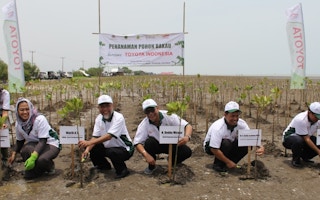The corporate world is under growing pressure to take responsibility for its impact on the natural world.
To continue reading, subscribe to Eco‑Business.
There's something for everyone. We offer a range of subscription plans.
- Access our stories and receive our Insights Weekly newsletter with the free EB Member plan.
- Unlock unlimited access to our content and archive with EB Circle.
- Publish your content with EB Premium.
Companies are not just being asked to come clean about their emissions, waste, water or deforestation footprint, ever more vocal shareholders and consumers want to know how businesses will eradicate the practices that lead to habitat loss and repair the damage done to natural ecosystems.
Without nature, the business world would slow to a crawl. More than half of the world’s gross domestic product depends on highly functioning biodiversity for food security, disease prevention, clean water provision and other essential services, which are worth US$44 trillion to the global economy.
There is also opportunity for businesses in nature restoration. Brands that adopt practices that help to regenerate nature will be more resilient to future economic shocks, and be better positioned to tap into emerging business opportunities, according to the report Regeneration rising: sustainability futures.
To mark World Environment Day on 5 June, which the United Nations has declared the beginning of a decade of ecosystem restoration, Eco-Business offers some advice for companies on how to have a positive impact on the natural world.
How harmful?
Every business is in some way bad for nature. But to work out exactly how harmful, a company needs to first calculate its impact. The best way to start is to identify the issues that are most relevant to the business, and establish a baseline. From there, it’s easier to work out how and where to focus nature restoration efforts.
Workplace wilderness
An ecologically-sensitive company should be walking the talk. So, assuming your business still has an office in an era where working-from-home has become the default, why not give it a green makeover? Abandon the trim lawns and tidy shrubs of the traditional office forecourt, and encourage a bit of wilderness. More greenery is not only a boon for biodiversity, it reduces stress, boosts productivity and reduces absenteeism. In the United States, doctors are prescribing nature experiences to help improve general health and wellbeing.

An office in nature in a woodland in Madrid. Image: Selgas Cano Architecture Office.
Caring culture
Corporate efforts to be better stewards of nature often start from the bottom up, so companies instill a culture of caring for natural areas will help push companies to do more to protect them. Organised activities that promote a better appreciate of nature, such as nature walks or forest bathing, will help sustainability teams achieve their ambitions for greening the business by galvanising popular support.
Adopt nature-friendly principles
A cliché companies are fond of using these days is “sustainability is in our DNA”. If it really was, then perhaps the world wouldn’t be in such a pickle. Businesses can move nature closer to the centre of their brands by doing the following three things: adopting circular economy principles, adopting responsible production and sourcing practices, and buying certified-sustainable commodities. “Transforming how goods are sourced and processed can provide benefits to our planet while also resulting in tangible gains for businesses by securing long-term supply of high quality materials,” says Stefanie Beitien, head of market transformation for environmental group WWF-Singapore.
Set meaningful targets
As well as trying to restore nature, companies need to try to weed out the destruction of forests and other ecosystems from their value chains. For some business that buy forest-risk commodities such as soy or palm oil, this is tricky. A good way to start is to make a public no-deforestation commitment, and align with Accountability Framework, a system for cleaning up supply chains supported by the likes of World Resources Institute, Proforest and World Wide Fund for Nature (WWF). Some targets will be missed. In 2010, the Consumer Goods Forum pledged for all of its members, which include the likes of Pepsi, Unilever and Nestle, to be deforestation-free by 2020. They’re not. Last year Mars declared it was deforestation-free, after removing a large number of palm oil mills linked to deforestation from its supply chain.
Eat different
Food production is the single biggest threat to the natural world. Switching the food on offer in the office cantine will help shift the food system from one which exploits the planet to one which restores it. Refer to WWF’s planet-based diet report to work out which diet works best where your business is located.
Don’t just offset, act
Billions are being pumped into nature-based solutions such as wetland, forest or coastal habitat restoration projects. These investments are often being made so that companies can offset their carbon emissions. Instead of just focusing on offsets, companies should proactively invest in nature restoration. To mark World Environment Day, Unilever, the world’s biggest buyer of palm oil, announced a US$10 million project to protect and restore 20,000 hectares of forest in Indonesia. For guidance on making meaningful and verifiable investments, WWF recommends the “Beyond Science-Based Targets Blueprint. WWF also suggests supporting local communities in their efforts to get certified for sustainable production, for instance ASC-certified seafood production.
Restore as you procure
New models are emerging that allow companies to invest in conservation as they buy forest-risk commodities such as palm oil, timber or soy. One example is the Rimba Collective, which launched in April. The more palm oil companies buy, the more they invest in conservation projects in Indonesia. The idea is to embed conservation into the cost of goods.
Join the club
It’s better together. Join other companies that have committed to reduce their impact on nature in organisations such as Business for Nature coalition, share stories, best practices and methods for improving.
Speak up
Naturally-inclined businesses should push governments to enact ambitious policies on nature restoration and support a global Paris-style treaty on nature restoration.
Be an open book
Many companies don’t even know where to start with nature restoration. Be transparent about the projects you’re involved in, and share data on outcomes. There’s a wild-west element to nature-based solutions. Highlighting reputable organisations and sharing stories of successful projects as well as those that have gone wrong will help firms just starting out.
Businesses interested in supporting the UN Decade on Ecosystem Restoration, go here.










